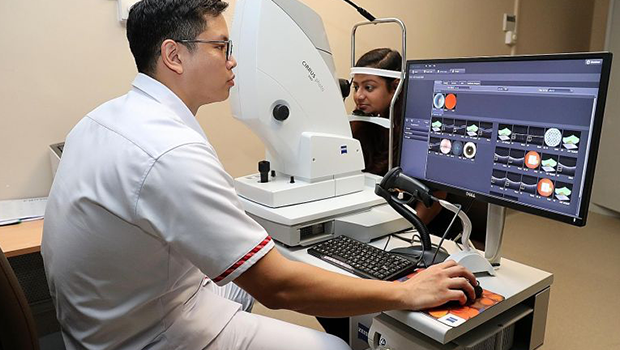
A mock screening session with artificial intelligence system Selena+. The system will be deployed across Singapore by 2022 to help detect eye conditions.ST FILE PHOTO
Singapore's national artificial intelligence strategy has kicked off with five projects in various sectors. Will the new technology make workers irrelevant? The Straits Times examines the issues.
Human teachers and healthcare workers will still play an important role even though Singapore has embarked on an aggressive plan to use artificial intelligence (AI) technologies in both the education and healthcare sectors.
EDUCATION
For one thing, there are no plans to use automated marking systems in exams including the Primary School Leaving Examination, the Ministry of Education (MOE) told The Straits Times.
Automated systems, to be rolled out to mark primary and secondary English language assignments by 2022, will be applied in limited areas such as open-ended, short-answer questions and essays.
"Our plan is to use an AI-enabled automated marking system to focus on language errors such as in grammar, spelling and syntax, with the teacher marking for ideas, structure and content," said an MOE spokesman. "It is likely that teachers will spend less time on routine assessment tasks, which will free up time for designing effective lessons... and building strong teacher-student relationships."
The national AI strategy was unveiled by Deputy Prime Minister Heng Swee Keat last month. Education is one of five AI projects identified. The others are in healthcare, transport and logistics, smart cities and estates, and border security.
On the sidelines of the Smart City Expo World Congress in Barcelona last month, Minister-in-charge of the Smart Nation initiative Vivian Balakrishnan said: "At the heart of education is interaction... I do not believe that AI will ever replace teachers. But there are some things that AI does well, for instance, in the identification of plagiarism and the customisation of curriculum."
An "adaptive learning" system for mathematics at the primary and lower secondary levels will be launched in 2025.
It will use machine learning to tell how each student responds to various learning materials and activities, and customise learning.
The automated marking system for English will collect data on common grammar mistakes so that teachers can focus on problematic areas.
The MOE will expand both systems to include more subjects in 2030.
Parents believe this is a prudent move. Parent and former teacher Shirleen Neo, 37, said: "This system has to be piloted and tried out in a few schools first, before such a drastic overhaul can be made."
A former General Paper (GP) teacher in a junior college, who declined to be named, said the human touch is irreplaceable in marking.
Citing GP as an example, he said: "The truly exceptional scripts that blow my mind let me feel the personality of the writer as well as his or her conviction."
Singapore Polytechnic lecturer Dora Chua, who teaches streaming analytics and the Internet of Things, said the AI programme will have to be exposed to many English assignments, in all kinds of variants, to have an idea of what constitutes an A or B grade.
Mr Liu Junhua, chief executive of education technology company ProQod, said the real challenge to adaptive learning could lie in designing and developing material to work with the new AI tool. For instance, content creators will have to think of the "dynamic routes" that different students may take and plan alternative content.
HEALTHCARE
In healthcare, a new system dubbed Selena+ will be deployed across Singapore by 2022 to help detect eye conditions, including diabetic eye disease.
Before Selena+, images were processed by human graders staring at retinal images on a screen.
The system was first tested for a few months from November last year in a few polyclinics and it has since processed over half a million images. A second trial will start this month in all polyclinics.
Dr Gavin Tan, director of the Singapore National Eye Centre's (SNEC) ocular reading centre, said AI does not remove the human from the screening process.
For instance, only primary grading - which is the first of three levels of checks and consists of the bulk of the grunt work - will be done by the machine, he noted. Senior graders will conduct the other levels of checks, which involve more detailed inspection of images flagged to have problems.
"Preliminary data shows that if we allow our most senior graders to review a certain category of the images, we can improve the overall accuracy of the programme," he said.
Selena+ was developed by the SNEC's Singapore Eye Research Institute and the National University of Singapore's School of Computing. It is licensed to local start-up EyRis.
Tests have shown that with Selena+, a patient with normal results could receive a report in just three minutes, instead of one hour.
The system has also proven itself to be as good as, if not better than, a trained grader.
Dr Tan said: "We expect to need less manpower, and anticipate that our overall sensitivity of the programme might increase… (Unlike human graders), there is no fatigue or concentration lapses."













 Get it on Google Play
Get it on Google Play